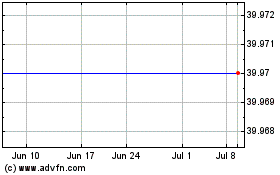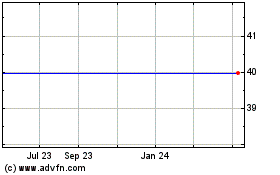Amid Great Expectations for the Economy and
Markets, RIAs Plan to Ramp Up Marketing and Technology Spending
Independent registered investment advisors (“RIAs”) are highly
optimistic that their firms will see continued success in 2017,
building on strong growth in 2016, and will be flexing their
marketing muscles to help make it happen, according to the latest
TD Ameritrade Institutional1 RIA Sentiment Survey.
The survey, conducted in the weeks following Election Day 2016,
reveals that bullish RIAs plan to rev up marketing, business
development and technology spending as well as implement a number
of growth strategies to help attract new clients and sustain
long-term expansion.
RIAs said they are upbeat on multiple fronts: nearly seven in 10
are optimistic about the U.S. economy -- the highest level since
the survey began in 2009 -- and more than half, 55 percent, feel
good about the prospects for the global economy. Likewise, 53
percent expect the U.S. stock market to rise, and an additional 35
percent see the market holding on to its 2016 gains.
Advisors are paying close attention to interest rates and
corporate earnings for their impact on client portfolios, but those
surveyed also believe that certain market sectors will benefit from
changes from inside the Beltway. The majority expects financial,
industrial and material companies to see the biggest gains under
the new administration.
“These are good days for independent RIAs, yet we can’t expect
market tides will always rise. RIAs need to deliver a great
experience, build firms that are more scalable and make sure they
are compensated for all the services they provide,” said Tom Nally,
president of TD Ameritrade Institutional, provider of brokerage and
custody services to more than 5,000 advisors. “By investing in
themselves, embracing technology and articulating all the value
they deliver, RIAs can increase their firms’ chances for
sustainable growth.”
Growing Firms See Bigger Gains in 2017
Advisor optimism may stem from finishing 2016 on a high note,
with strong gains in assets, revenue and clients in the latter half
of the year for most firms. Seventy percent had assets grow on
average by 17 percent, while 60 percent saw revenues increase by 16
percent on average. Likewise, 56 percent of advisors say new client
growth averaged 17 percent.
With the economy seen as having has the biggest impact on
growth, four out of five advisors predict their firms’ assets will
grow further in 2017, and half of these advisors predict firm
assets will grow even more than last year.
RIAs also continued to attract clients from other financial
services channels. Nearly a third of new clients came from
full-commission brokers - the largest source - and self-directed
investors were the second-largest source of new clients moving to
independent RIAs in 2016.
Investing for the future
Looking ahead, advisors expect their biggest operational
spending increases to be in marketing, followed by technology. They
rank marketing and social media initiatives among their top
strategic priorities this year.
The planned increases make sense given that marketing and
advertising are the main ways they plan to attract new business in
2017, including the next generation of potential clients. In terms
of technology spending, reinvigorating client-facing tools like
websites and social media programs are among the top upgrades
planned for 2017.
In 2016, advisors had their biggest increases in spending in
technology, followed by legal and compliance. Conversely, most
firms report that hiring / human resources and real estate-related
expenditures were down from 2015.
Confidence is High Despite Industry Pressures
Though many anticipate 2017 to be another year where industry
pressures intensify, most RIAs seem confident they can navigate
what lies ahead. In the face of regulation, the emergence of
low-cost digital upstarts, or the need to draw up formal succession
plans, RIAs expect their firms will continue to thrive. More
specifically:
- Department of Labor (DOL) conflicts
of interest rule. The April 10, 2017, deadline for compliance
means increased compliance costs for some RIAs, but the majority
says it has been business as usual. Others say the new standards
are a growth opportunity.
- Robo-advisors. Eighty-two
percent of advisors say they have minimal - if any - concerns over
robo-advisors as a competitive threat. RIAs say robos cater to a
different market and their own growth has largely not been impacted
by them.
- Business continuity plans.
Fifty-seven percent of advisors have business continuity plans
finalized, and 31 percent have plans in the works. Eight in 10 are
aware of the Securities and Exchange Commission's proposed Rule
206(4)-4 requiring such plans.
“RIAs have been the fastest growing channel in the financial
advice marketplace in large part because they offer investors a
personalized, client-first approach. At the same time, they have to
find ways to navigate the myriad market forces converging on the
industry if they want to keep growing,” Nally said. “RIAs can
continue to grow by facing challenges head on, whether that means
developing a robust retirement plan business, attracting a new
generation of clients or embracing new technology to deliver a
better digital experience.”
Spotlight on Exchange-Traded Funds
The vast majority of RIAs today use exchange-traded funds (ETFs)
in their clients’ portfolios. Compared to other investment
vehicles, advisors turn to ETFs for their lower costs, market
liquidity and a convenient way to achieve asset-allocation
goals.
The survey, though, found that advisors look first and foremost
at the quality of the underlying index when considering which
specific ETFs to purchase for clients, followed by the fund’s
performance track record. Expense ratios and trading costs were of
lesser concern. When looking at a fund’s track record, advisors
should keep in mind that past performance does not predict future
results.
Despite the variety of offerings on the market, advisors largely
stick to a few types of ETFs to manage client assets. Equity index
ETFs are “always” or “sometimes” used by 82 percent of the advisors
surveyed, while two thirds say they use industry-sector ETFs.
These categories were trailed by fixed-income index funds, used
by 58 percent of advisors, and real estate ETFs, 56 percent. Usage
of more esoteric products, such as inverse or leveraged ETFs or
funds based on “smart-beta” and other fundamental-weighted indexes,
was far less frequent.
Actively managed ETFs, a relatively new asset class, may already
be making headway. Among the firms surveyed, 32 percent of advisors
sometimes use these ETFs.
To download a slide presentation featuring highlight results
from the survey, please visit
http://www.amtd.com/files/doc_downloads/research/2017/RIA-Sentiment-Survey.pdf
Advisors should carefully consider investment objectives, risks,
charges and expenses before investing in an ETF for their clients.
A prospectus, obtained by calling 866-766-4015, contains this and
other important information about an investment company. Read
carefully before investing.
About the SurveyThe results of TD Ameritrade
Institutional 2017 RIA Sentiment Survey are based on a phone survey
conducted by MaritzCX on behalf of TD Ameritrade Institutional, a
division of TD Ameritrade Inc., of 306 registered investment
advisors (“RIAs”), between Nov. 14 and Dec. 5, 2016. Survey
participants were asked to share their views on economy, the
outlook for their firms and the RIA market overall. Participants
may be clients of TD Ameritrade Institutional and other custodians.
The margin of error in this survey is ±5.6%.
MaritzCX and TD Ameritrade, Inc. are separate, unaffiliated
companies and are not responsible for each other's products and
services.
About TD Ameritrade InstitutionalTD Ameritrade
Institutional is a leading provider of comprehensive brokerage and
custody services to more than 5,000 fee-based, independent
registered investment advisors and their clients. Our advanced
technology platform, coupled with personal support from our
dedicated service teams, allows investment advisors to run their
practices more efficiently and effectively while optimizing time
with clients. TD Ameritrade Institutional is a division of TD
Ameritrade, Inc., a brokerage subsidiary of TD Ameritrade Holding
Corporation.
About TD Ameritrade Holding CorporationMillions of
investors and independent registered investment advisors turn to TD
Ameritrade (NASDAQ: AMTD) technology, people and education
resources to help make investing and trading easier. Online or over
the phone. In a branch or with an independent RIA. First-timer or
sophisticated trader. Our clients want to take control, and we help
them decide how - bringing Wall Street to Main Street for more than
40 years. An official sponsor of the National Football League for
the 2016 season, TD Ameritrade has time and again been recognized
as a leader in investment services. Visit TD Ameritrade's newsroom
or amtd.com for more information.
Brokerage services provided by TD Ameritrade, Inc., member FINRA
/SIPC
1 TD Ameritrade Institutional is a division of TD Ameritrade,
Inc., a brokerage subsidiary of TD Ameritrade Holding
Corporation.
Source: TD Ameritrade Holding Corporation
View source
version on businesswire.com: http://www.businesswire.com/news/home/20170110005161/en/
TD Ameritrade Holding CorporationJoseph Giannone,
201-369-8705Communications + Public
AffairsJoseph.Giannone@tdameritrade.com
TD Ameritrade (NASDAQ:AMTD)
Historical Stock Chart
From Mar 2024 to Apr 2024

TD Ameritrade (NASDAQ:AMTD)
Historical Stock Chart
From Apr 2023 to Apr 2024
